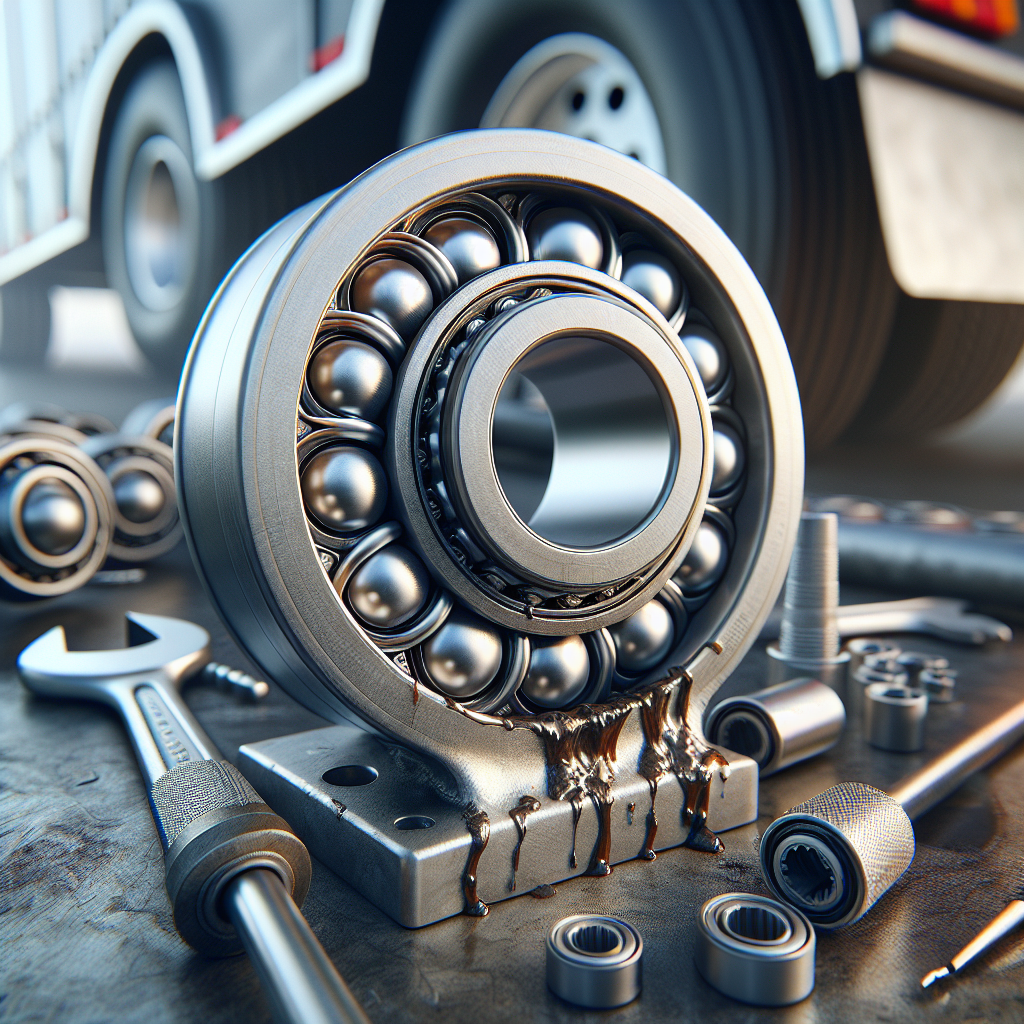

Maintaining your trailer's wheel bearings is an essential aspect of ensuring safety and performance during travel. **_Trailer wheel bearings_** are crucial components that facilitate smooth rotation of the wheels by reducing friction and supporting the weight of the trailer. Neglecting their maintenance can lead to serious issues, including overheating, tire blowouts, and even accidents on the road.
Regular inspection and maintenance of wheel bearings help prevent costly repairs and downtime. Here are key reasons why understanding the importance of wheel bearing maintenance is vital:
- Safety: Well-maintained wheel bearings reduce the risk of wheel detachment, ensuring that your trailer remains securely attached during transit.
- Performance: Properly lubricated bearings enhance the efficiency of your trailer's movement, improving overall fuel consumption and handling.
- Longevity: Frequent maintenance extends the lifespan of the wheel bearings, saving you money in the long run.
Don’t overlook your trailer's wheel bearings; regular packing is imperative for a safe towing experience. Tow with peace of mind, knowing that trailerwatchdog is standing guard. Visit trailerwatchdog.com to learn more about our innovative trailer monitoring solutions.
Signs That Indicate Wheel Bearings Need Packing

Recognizing the signs that your trailer's wheel bearings need packing is crucial for maintaining safety and performance. Ignoring these indicators can lead to severe mechanical failures, resulting in costly repairs or even dangerous situations on the road. Here are some common signs to watch for:
- Unusual Noises: If you hear a grinding, humming, or rumbling sound coming from your trailer, it may indicate that the wheel bearings are worn out or lack sufficient lubrication.
- Excessive Heat: After a long trip, carefully check the wheel hubs. If they feel excessively hot to the touch, this could signal that the bearings are not adequately packed with grease.
- Vibration or Wobbling: Any noticeable vibrations or a wobbling sensation while towing could be a sign of failing wheel bearings. This instability can affect vehicle control.
- Visible Damage: Regularly inspect the wheel bearings and surrounding components. Look for signs of rust, pitting, or any unusual wear and tear.
Addressing these signs promptly can help prevent further damage and ensure that your trailer operates smoothly. Regular maintenance checks will not only prolong the life of your wheel bearings but also enhance your overall towing experience.
Recommended Frequency for Packing Trailer Wheel Bearings
When it comes to the question of how often should trailer wheel bearings be packed, the answer depends on various factors including the type of trailer, usage, and environmental conditions. Generally, it's recommended to pack the wheel bearings at least once a year, but this can vary based on your specific situation.
Here are some guidelines to help you determine the appropriate frequency for your trailer:
- Usage: If you frequently use your trailer for heavy loads or long-distance travel, consider packing the bearings every six months. Heavy usage creates more heat and stress on the bearings, leading to faster wear.
- Environment: Trailers that are regularly exposed to harsh conditions such as saltwater, mud, or extreme temperatures may require more frequent maintenance. In these situations, checking and packing the bearings every three to six months is advisable.
- Storage Conditions: If your trailer is stored outside or in damp environments, moisture can affect the bearings. It's wise to inspect and pack them more often in these cases.
- Manufacturer's Recommendations: Always refer to the trailer manufacturer's guidelines for specific maintenance schedules. Following these recommendations will ensure that you maintain optimal performance.
By adhering to these frequency guidelines, you can help prevent unexpected failures and enhance the lifespan of your trailer's wheel bearings, ensuring a safer towing experience.
Protect your trailer
Step-by-Step Guide to Packing Wheel Bearings

Packing your trailer's wheel bearings is a crucial maintenance task that ensures smooth operation and safety on the road. Here’s a step-by-step guide to help you through the process:
- Gather Your Tools: You’ll need a few essential tools, including a bearing packer, grease, a socket set, and a clean workspace.
- Remove the Wheel: Start by jacking up the trailer and removing the wheel. Make sure to loosen the lug nuts before lifting the trailer for easier removal.
- Take Out the Hub: Once the wheel is off, remove the hub by taking out the retaining clip and the nut that holds it in place. Be careful not to damage any components during this process.
- Clean the Bearings: Use a clean rag and solvent to thoroughly clean the bearings and the hub. Removal of old grease and dirt is vital for optimal performance.
- Pack the Bearings: Using a bearing packer or your hands, apply a generous amount of grease into the bearing. Ensure that the grease fully fills the bearing and is evenly distributed.
- Reassemble the Hub: After packing the bearings, place them back into the hub. Secure the hub with the retaining nut and clip, ensuring it’s snug but not overly tight.
- Reattach the Wheel: Finally, put the wheel back on the spindle, tighten the lug nuts in a star pattern, and lower the trailer back to the ground.
Following these steps will help ensure that your wheel bearings are properly packed and maintained. Regular checks can help you avoid future problems, keeping your trailer in excellent working condition.
Best Practices for Long-Lasting Wheel Bearings

Maintaining your trailer's wheel bearings is essential for ensuring longevity and optimal performance. Here are some best practices to keep your wheel bearings in top shape:
- Regular Inspections: Schedule routine checks of your wheel bearings to detect any signs of wear or damage before they become serious issues. Look for unusual sounds or vibrations during trailer operation.
- Use Quality Grease: Always use high-quality grease that is suitable for your specific trailer and bearing types. The right grease can help withstand high temperatures and pressure, extending the life of your bearings.
- Proper Packing: Ensure that you are adequately packing the wheel bearings with grease. Insufficient grease can lead to overheating and premature failure, while excessive grease can cause pressure buildup.
- Monitor Temperature: Keep an eye on the temperature of the wheel bearings, especially during long trips. An increase in temperature can indicate a problem, such as insufficient lubrication or misalignment.
- Keep It Clean: Dirt and debris can significantly affect the performance of your wheel bearings. Always clean the bearings thoroughly before repacking, and ensure that the area around the bearings remains clean and free of contaminants.
- Avoid Overloading: Make sure your trailer is not overloaded, as excessive weight can put additional stress on the wheel bearings, leading to faster wear and potential failure.
By implementing these best practices, you can ensure that your trailer's wheel bearings remain in excellent condition, providing you with a safer and more reliable towing experience.
How Trailer Monitoring Systems Enhance Bearing Longevity

In an era where technology plays a pivotal role in enhancing vehicle safety and performance, trailer monitoring systems have emerged as invaluable tools for maintaining the longevity of wheel bearings. These systems are designed to provide real-time data on various parameters, enabling trailer owners to take proactive measures in their maintenance routines.
One of the key benefits of a trailer monitoring system is its ability to track axle temperature. Elevated temperatures can be a precursor to bearing failure, often indicating insufficient lubrication or overloading. By monitoring these temperatures, you can address potential issues before they escalate into catastrophic failures. Additionally, tire data provided by these systems helps ensure that the trailer is not carrying excess weight, which can also contribute to premature bearing wear.
Moreover, trailer monitoring systems often feature alerts and notifications that inform you of any anomalies in the system. This means that you can receive immediate updates about the condition of your bearings and take corrective actions swiftly, ensuring that you maintain optimal performance and safety.
Integrating a trailer monitoring system into your maintenance strategy not only enhances the longevity of your wheel bearings but also provides peace of mind while towing. Tow with peace of mind, knowing that TrailerWatchdog is standing guard. For more information on how to equip your trailer with our advanced monitoring system, visit trailerwatchdog.com.




